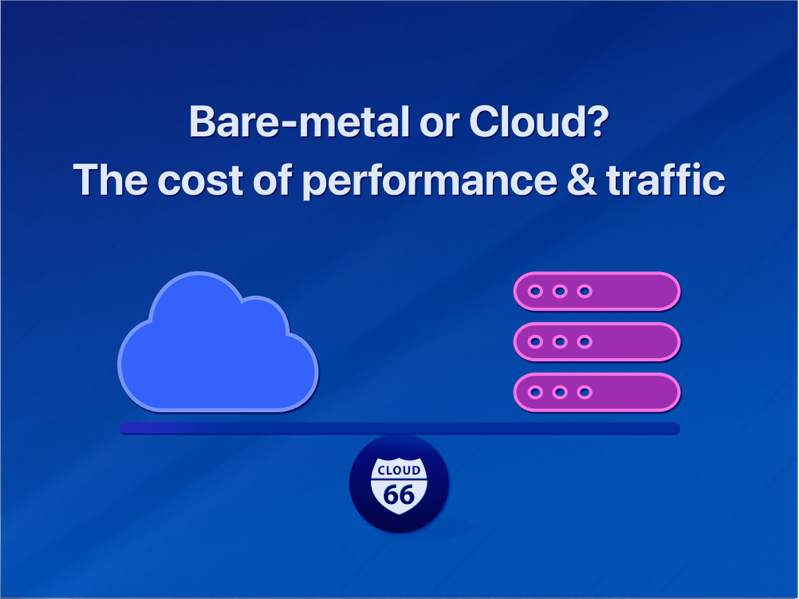
Bare metal servers are a valuable option for all sizes of businesses, including small, medium, and startups companies. When designing infrastructure it is important to manage cost. However, the decision on whether to run your application on bare metal or cloud provider should not be driven by the size of your company but by your infrastructure needs. Each approach has its own tradeoffs and complexities, especially since it is difficult to find two clouds with the same parameters.
When is bare metal best?
Let’s start with a bare metal overview. What are bare metal's characteristics and what infrastructure problems can they help us to resolve?
- Bare metal offers greater control than the cloud, as the VM layer is removed. The developers can access the physical infrastructure directly and get more detailed information in case of failure.
- You "own" the servers and you don’t share them with others, whereas cloud providers routinely host multiple virtual servers for different users on the same physical server. In rare cases, someone else's security breaches can affect your application. Also, as the software layer is removed from the bare metal, it reduces points of attack.
- The single-tenant feature guarantees isolation for the servers. This is great news for companies with security and compliance requirements. Additionally, it provides better performance as there are no multi-tenant or hypervisor overheads.
- Your application workers should run faster on the bare metal as there is no hypervisor to slow them down.
- The higher cost is a myth. Bare metal can be perceived as an expensive option, and for that reason, it is often overlooked by startups. However, when you compare the performance cost, running your application on bare metal can be cheaper than on the virtualized cloud.
- Bare metal is less agile than the cloud. It is harder to scale horizontally, or on-demand. Therefore it is not the best option for companies that need to add and remove servers in large quantities and at short notice.
- Bare metal requires more operational management e.g. database backups, recovery, etc.
Is bare metal for startups?
In general, startups don’t have deep pockets. They require the flexibility to test and try new things and the ability to scale their infrastructure overnight if needed. They also need to provide reliable service as they don’t want to crash just before takeoff.
Bare metal and virtual cloud are both good choices for startups. It all depends on your infrastructure needs. Startups that host consumer websites and applications often opt-in for cloud (VM) infrastructure. For example e-commerce, education, health, etc.
Bare-metal is often a better choice for startups that require higher performance processing, big data systems, data analytics, and machine learning. For example, it would be a good choice for fintech, gaming, streaming services, or AI companies.
The differentiation above can help you make the best business/technology decision on where to run your application. Cloud? Or bare metal? The resulting application may behave the same on the surface but could be very different under the hood. Moving from bare metal to cloud or vice versa may require significant changes to both architecture and code.
The cost: bare-metal vs cloud
The management and administration of bare-metal cloud and traditional cloud services (VMs) are similar. Since we partnered with Latitude.sh, we will compare Latitude.sh (a global bare metal cloud provider) with traditional cloud offerings from AWS, DigitalOcean, Google Cloud, and Microsoft Azure.
Update: Maxihost is now Latitude.sh.
Cost of Performance:
Let’s see how it works in practice and compare the prices of bare metal with the popular cloud providers. It's tricky to find a unified measurement. For example, if we look at the Cores/CPUs, some virtual CPUs represent a share of the physical CPU and cannot be treated in the same way, unless they are dedicated CPUs.
We picked a small Latitude.sh server: The Intel Xeon E-2276G that includes 6 cores with a 3.8GHz clock and compared it to 8 CPUs servers from AWS, DigitalOcean, Google Cloud, and Microsoft Azure.

Latitude.sh is the outright winner in regards to price based on the performance over VMs.
Cost of traffic:
To have a clear pricing picture we need to include a traffic cost (both egress and ingress) in the total price. None of the providers has an ingress charge. We measured egress pricing based on a typical rate to transfer 10TB a month per GB.

The egress charges depend on the volume of data that is moving - the more data moves the more costly it is for you. For tips on how to manage your traffic costs, check out the Faction blog post on ‘Cloud Egress Charges: How to Prevent These Creeping Costs’.

Latitude.sh offers the best value based on performance and traffic costs ($147). Google Cloud offers the best value amongst cloud providers ($294). AWS and Microsoft Azure have the highest charges, mainly pushed up by the egress cost. Lastly, DigitalOcean pricing remains mid-range.
Both types of infrastructures have their advantages and disadvantages and it is up to you to choose the right one for your application. Bare metal offers better performance and can be very affordable but it lacks the convenience and flexibility of virtualization, whereas traditional VM cloud is more costly but offers automation and virtualization layers, and you never have to worry about hardware failure.
The good news is that, in any case, Cloud 66 works well with both bare metal and cloud infrastructure and helps your developers to deploy and manage your applications with ease. Saving the time to work on what your business really needs, while we will take care of your infrastructure and DevOps.
Get started with Cloud 66 and Latitude.sh
Watch a 2 mins video to see how to deploy your application to bare-metal servers with Latitude.sh and Cloud 66. Benefit from the bare metal cost and Cloud 66 DevOps services.
